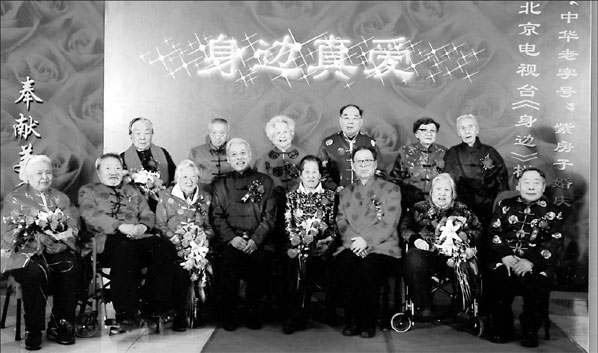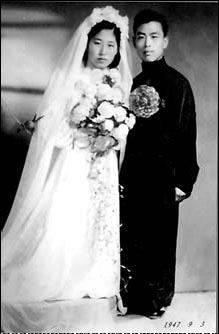The group picture of the seven couples celebrating their 60th wedding-anniversaries last December. File Photo
"You are a goddess sent by Yuexia Laoren (the Old Man under the Moon or the matchmaker of Chinese fairy tales). You have crescent-shaped brows, cheery eyes and a peach-like face. You look so graceful in your white gown and when you smile bashfully, cute dimples appear in your cheeks."
These words flow from the pen of 79-year-old Wu Yongzeng as he records his first impressions of his wife Li Shuqing, 80, in his five-chapter poem, Ode to Our 60th Wedding Anniversary.
Like many couples of their generation, Wu and Li's marriage was arranged by their parents and matchmakers. Natives of Zhuozhou, Hebei province, they were near strangers when they got married.
"Our two families lived quite close to one another. We did cross on the street a few times, but we never talked," says Wu, a machinery plant retiree. It was not until the day of their wedding photo-shoot, that Wu and Li met for the first time.
"She was even more beautiful than she looked in the photo the matchmaker showed me," he recalls.
Wu fell in love instantly but Li was too shy to even look at her husband-to-be. She was busy having her hair curled and putting on a Western wedding gown. Their only exchange that day was a goodbye.
The couple celebrated the 60th anniversary of their marriage in December with six other elderly couples, all of whom were married in a group wedding on September 3, 1947. Wu and Li were also joined by their five children for the celebrations.
Wu says the Beijing (then called Beiping) municipality initiated annual group weddings in the 1930s, in a bid to simplify the extensive wedding ceremonies of olden times. The practice was suspended during the War of Resistance Against Japanese's Aggression (1937-45) but made a comeback after the war. Wu and Li attended the seventh session of the group weddings, along with 48 other couples.
"At that time, a traditional wedding cost hundreds of dollars. It was a huge financial burden for ordinary families, many of whom then struggled to make ends meet. In contrast, the authorities charged a mere 17 dollars per couple for the group wedding, as well as the photo shoot, wedding attire and four bags of candies," Wu says.
One of Wu's colleagues in the railway company also applied for the group wedding but later withdrew, because his parents couldn't accept the new-style wedding sans the sedan-chair carrying, kowtowing and other formalities.
The group wedding ceremony was held in the Huairentang Hall inside Zhongnanhai. Wu says Zhongnanhai was then partly open to the public as a park. It was the first time for the couples in Huairentang, which was used only for significant official events. Brides, in Western wedding dresses, and grooms, in Chinese long gowns, walked towards each other and to the front of the stage. He Siyuan, then mayor of Beijing, presided over the weddings.
"The ceremony was grand yet simple. And in the eyes of the youth of that time, it was also quite fashionable," Wu says as he flips over copies of old newspapers reporting their group wedding. On one of them, he identifies himself and his wife among a bunch of people in a photo.
"We didn't know the other couples. Neither did we talk much during the wedding. Several decades have gone by and we would love to know how they are doing."
With help from Beijing Television Station, they reunited with six other couples for a grand diamond wedding anniversary. "We were all very excited to see each other again. I felt like I was getting married again," says Li Shuqing.
Wu Yongzeng and Li Shuqing's wedding photo taken in 1947.Courtesy of Wu Yongzeng
The capital has seen a rash of grand 50th-and-plus wedding anniversaries stirred up by grass-root organizations and local media, after a high-rating TV series, Golden Marriage (Jin Hun) took local audiences by storm.
The TV series dealt with the married life of a common Beijing couple, Tong Zhi and Wen Li, spanning over half a decade, and offered an insight into the changes in Chinese attitudes toward marriage and family relations. It resonated with a lot of elderly couples who shared similar experiences with the TV characters.
When Wu Jingchi and Zhang Zhongquan married in 1952, they had neither a large dowry nor a grand wedding. They lived in a shabby courtyard with Zhang's parents and his brother's family. Their only wedding gift was a second-hand cabinet.
After the birth of their first child, Zhang went to Beijing to study while Wu stayed behind in her hometown in Hebei, shouldering all the farm work and housework.
Wu remembers she left her baby daughter home alone one night, for she had to attend a villagers' meeting and there was no relative to take care of the kid. The child was missing when she returned. Sick with fear, she searched everywhere frantically. It turned out the neighbors were awakened by the baby's crying and took her home to look after her.
The couple united in Beijing several years later but their life became even more difficult after the birth of two more children.
"Our monthly income was 52 yuan, a portion of which we used to send to our relatives in our hometown. What was left was barely enough to support the household," says 74-year-old Zhang Zhongquan.
The couple enjoyed their first wedding cake and took their first photo in Western wedding gowns at the group golden wedding anniversary celebrations in their community last year.
"A lot of elderly couples choose photo shoots in Western gowns when they celebrate their wedding anniversary," says Xi Yu of a Beijing photography studio. "At first, there were just a few elderly customers who were brought to the studio by their children. They thought it unnecessary to take wedding photos at their age. They were uncomfortable with the make-up and attire that we provided and looked quite nervous before the camera."
Now, however, he says, more and more elderly couples come on their own for a photo shoot.
"They show no intentions of being left behind by the youth in catching the trend. Once, when an elderly couple was shooting photos, I heard a young couple saying, "wish our marriage is as happy as theirs 50 years later".
"Times were much harder in past decades, but we pulled through. Now we want to enjoy every moment of the rest of our life," says Wu Yongzeng, who plans to travel across the country with his wife and celebrate their 70th wedding anniversary one day.
"We do not just celebrate the successful marriages of these couples," says Zhang Xinhui from the residents' committee of Zhang Zhongquan's neighborhood. "They are good examples for us youngsters and show us that mutual understanding, tolerance and responsibility make for a long and harmonious marriage no matter how times change."
(China Daily February 20, 2008)



